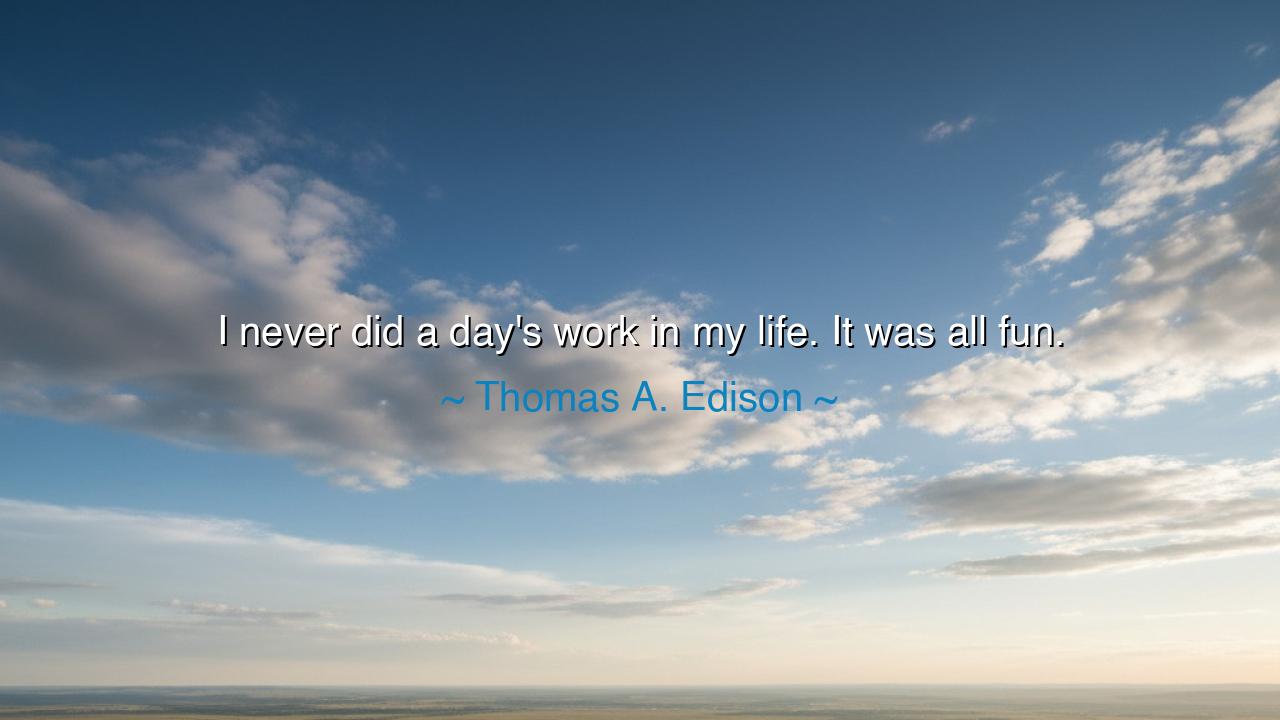
I never did a day's work in my life. It was all fun.






Hear the joyful words of Thomas A. Edison, master of invention and tireless seeker of light: “I never did a day’s work in my life. It was all fun.” In this simple declaration lies the secret of genius—that when work is joined with passion, it ceases to feel like labor and becomes instead a game of discovery, a dance of the spirit. For what others call toil, the lover of his craft calls delight.
To say he never did a day’s work is not to deny his endless hours of labor, but to transform their meaning. Edison’s hands and mind were ceaselessly engaged, yet because his heart rejoiced in the pursuit of knowledge, those hours felt not like burden but like play. Thus he reveals the truth: when the soul finds joy in its task, even the hardest effort feels light.
The fun he speaks of is not idle amusement but the deep satisfaction of creation. To fashion something new, to wrestle with mystery and bring forth invention, was for Edison the highest form of pleasure. In this he echoes the wisdom of the ancients, who taught that man is happiest when he fulfills his nature—when the thinker thinks, the builder builds, the artist creates.
This saying springs from the life of one who gave himself wholly to his calling. Edison’s countless trials and experiments would have crushed the weary, but his joy in discovery sustained him. His words teach that perseverance is not born of duty alone, but of love for the work itself. Joy, not compulsion, is the fuel of greatness.
Thus let the teaching endure: seek the work that brings you joy, for then labor becomes play, and every day is filled with light. When passion and duty are made one, life itself becomes a festival of creation. Edison’s words remind us that true success is not in wealth or fame, but in finding delight in the labor of our hands and the calling of our spirit.






BAPham Bao Anh
I think Edison’s quote is a great reminder of how passion can transform even the hardest tasks. But I’m curious—does this mean that those of us who don’t find joy in our work are somehow missing the mark? How do we reconcile the need to earn a living with the desire to have fulfilling, enjoyable work? Can we learn to find joy in tasks that may not seem fun, or is passion truly the key to enjoying what we do?
QNHo Quynh Ngoc
Edison’s quote is fascinating because it challenges the conventional view of ‘work’ as something we endure. It suggests that if we are truly passionate about what we do, work becomes fun. But does this mean that the concept of ‘work’ is inherently flawed? If we redefine what work means to us, can we all find enjoyment in it, or do we just need the right job to make that happen?
TPThuy Pham
I love this quote because it speaks to the idea of turning passion into work. When you love what you do, it doesn’t feel like a chore, but is this always possible? For those who are passionate about their careers, this is true, but what about people working jobs they need to survive? Does Edison’s statement suggest that if we don’t enjoy our jobs, we’re doing something wrong? Or is it about finding small sparks of joy in the everyday tasks?
NCN.T.K Channel
Thomas Edison’s quote gives the impression that work doesn’t always have to be burdensome. If you’re doing something you’re passionate about, it doesn’t feel like work at all. But what about those who are stuck in jobs they don’t enjoy? Does this quote set unrealistic expectations? Can people truly turn every task into ‘fun’ or is it just a fortunate perspective that not everyone can achieve?
Kkillniggers
Edison’s perspective here seems ideal, but I wonder if it applies to everyone. Some people love their jobs, and for them, it’s not work—it’s something they truly enjoy. But for others, work can feel like a daily grind. Is it possible for everyone to find ‘fun’ in their work, or do certain circumstances and pressures make that unattainable for many? Could it be more about mindset than the actual work itself?